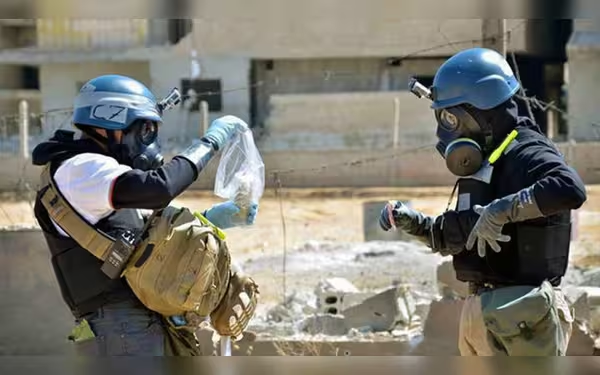Sunday, December 22, 2024 02:10 PM
Syria's Chemical Weapons Stockpile Raises Global Alarm
- Syria's chemical weapons declaration remains incomplete.
- OPCW identifies 19 unresolved issues regarding chemical agents.
- Syria's voting rights suspended due to chemical attacks.
 Image Credits: arabnewspk
Image Credits: arabnewspkThe OPCW raises serious concerns over Syria's incomplete chemical weapons declaration, highlighting unresolved issues and the need for accountability.
The ongoing conflict in Syria has raised numerous concerns on the global stage, particularly regarding the use of chemical weapons. In 2013, Syria made a commitment to join the Organization for the Prohibition of Chemical Weapons (OPCW) after a devastating chemical gas attack near Damascus resulted in the tragic loss of over 1,400 lives. Despite this agreement, the situation remains dire, as the OPCW has recently expressed serious concerns about significant gaps in Syria's declaration of its chemical weapons stockpile.
During the OPCW's annual meeting, Director-General Fernando Arias highlighted that, "Despite more than a decade of intensive work, the Syrian Arab Republic chemical weapons dossier still cannot be closed." This statement underscores the ongoing challenges faced by the international community in ensuring that Syria complies with its obligations. The watchdog has previously accused President Bashar Assad's regime of using chemical weapons against civilians throughout the brutal civil war that has plagued the nation.
Arias pointed out that since 2014, the OPCW Secretariat has identified a total of 26 outstanding issues related to Syria's chemical weapon stockpiles, of which only seven have been addressed. He stated, "The substance of the remaining 19 outstanding issues is of serious concern as it involves large quantities of potentially undeclared or unverified chemical warfare agents and chemical munitions." This revelation raises alarm bells, as it suggests that there may still be significant amounts of dangerous materials unaccounted for.
In a notable move, Syria's voting rights within the OPCW were suspended in 2021, marking an unprecedented rebuke following poison gas attacks on civilians in 2017. The watchdog also attributed blame to Syria for a chlorine attack in 2018 that resulted in the deaths of 43 individuals, further straining relations between Damascus and Western nations. Despite these accusations, the Syrian government has consistently denied any wrongdoing, asserting that it has fully disclosed its chemical stockpiles.
The civil war in Syria, which erupted in 2011, was ignited by the government's harsh crackdown on peaceful protests. This conflict has not only claimed more than half a million lives but has also displaced millions and devastated the country's infrastructure and economy. The implications of the ongoing chemical weapons issue are profound, as they not only threaten the safety of civilians but also challenge the credibility of international agreements designed to prevent the use of such weapons.
As the world watches, the situation in Syria serves as a stark reminder of the complexities of war and the dire consequences of chemical warfare. It is crucial for the international community to remain vigilant and proactive in addressing these issues, ensuring that accountability is upheld and that the safety of innocent lives is prioritized. The hope is that through continued dialogue and pressure, a resolution can be reached that not only addresses the chemical weapons concerns but also paves the way for lasting peace in Syria.













